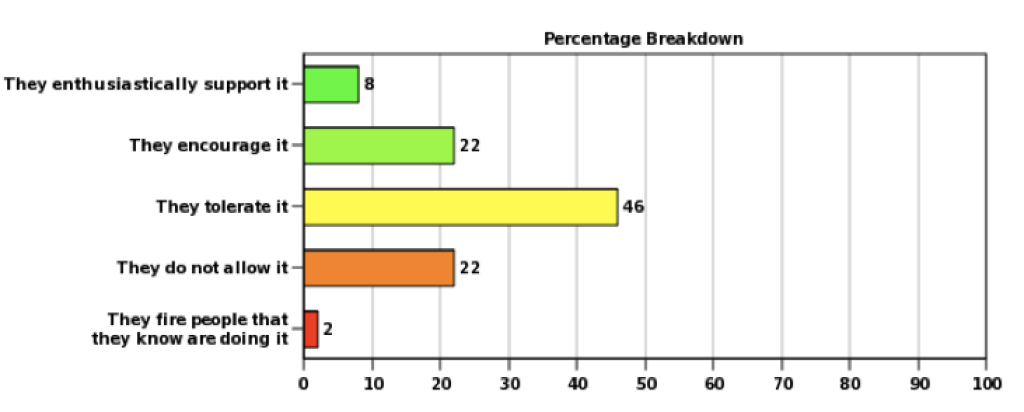Is hybrid entrepreneurship (side hustles) a training opportunity?
CHROs and managers instinctively like to discourage staff from having side hustles. But should this mindset shift to them seeing the benefits it brings to the business?

Whether its due to the rising cost of living; dissatisfaction staff have with their current job, or the desire to start something for themselves (or a combination of all three), it seems there is something of a boom in the numbers of people with ‘side hustles’.
Data suggests a staggering 34% of Americans now have a side-gig of some sort (rising to an even more staggering 70% amongst millennials) – and all told, the US side hustle market is valued at over $2.58 trillion.
The more grown up phrase we sometimes see for describing people with side hustles is the more exciting-sounding ‘hybrid entrepreneur’ – which is defined as someone who is trying to start a new business while still working full time and keeping their insurance, salary and relationships.
Some of the biggest business people we know started off as hybrid entrepreneurs – everyone from Steve Wozniak at Apple, Pierre Omidyar from EBay, and Jack Dorsey at Twitter to name but a few.
But whatever name we give to these people, CHROs and management more generally have always had a strained relationship with these people.
Business always says it craves innovation and entrepreneurship – but (understandably), they want it internally focused.
When it comes down to it, do business owners support or want their employees striking out on their own?
This was a question I wanted to find the answer to,
In a survey that I recently finished as part of Leadership Pulse™ (a project that started in 2003) we specifically explored this question. More than 300 managers answered the survey over the summer), and the results are interesting to say the least.
Do organizations support hybrid entrepreneurship?
The first question we asked was directly whether their organization’s management team supported hybrid entrepreneurship.
Using a 1 to 5 scale, where 1 is they fire people that they know are doing it, 3 is they tolerate it and 5 is they enthusiastically support it, the average score was 3.12.
The bar chart below shows the responses to each answer:

Do businesses know how many of their staff are hybrid entrepreneurs?
We next asked what percentage of the employee population they thought were practicing hybrid entrepreneurship, and the mean was 19.40; the chart below shows that distribution:

What impact do you think hybrid entrepreneurship has?
The last quantitative question we asked was “what impact on the day job performance do you see in practicing hybrid entrepreneurship?”
The mean for this question response, with 1 being very negative, 3 being neither positive nor negative and 5 being very positive is 3.22.
A total of 41% responded positive or very positive; 39% responded with neither positive nor negative, and 20% responded negative or very negative.
What do the numbers tell us?
This quick pulse survey seems to indicate that hybrid entrepreneurship is something managers are seeing in their workplace. It’s being done, and opinions are showing that only about 30% of companies are supporting it. In fact, 24% seem to have policies discouraging employees from doing it.
However, the big question is whether this type of experience brings value to an organization.
It certainly provides employees with valuable learning focused on creating value from a new idea. Given the high need of most organizations to innovate, one could make a case to encourage this type of experience.
The hybrid entrepreneur dilemma
The manager dilemma is obviously that they may worry employees spend less time on their day jobs, or that they will be successful and leave.
Also, is this the type of role model they want in their organizations?
We asked respondents to the survey to elaborate on their responses via open-ended comments, and below are a few notable pieces of feedback from these managers and senior leaders:
“Within my organization, working on your own is not discouraged. However, this is not generally viewed as something value added to the organization. This is unfortunate, however, just today I spoke to a colleague who does work outside of the organization. He mentioned that his motivation to do so was due to his feeling valued by the organization, however, this motivated him to be successful within his entrepreneurial career.”
“We are all entrepreneurs and we encourage members of the team to pursue outside as well as inside innovation.”
“Jobs have become bigger and more demanding. A side entrepreneurship is highly likely to have a detrimental impact on performance.”
“I think there are benefits to the organization but at the same time it can sometimes distract from company matters so on balance impact is neutral.”
“Productivity has increased as well as performance.”
“The leadership of my organization understands the benefits of hybrid entrepreneurship and fully embraces it.”
“People cannot concentrate on the job in hand if they are trying to build their own businesses. Also there may be a conflict of interest.”
“It encourages employees to perform better.”
What about the learning?
What was interesting about these responses, was the fact I reviewed more than 200 comments made by respondents, and only three addressed the topic of learning.
As an educator, I was very surprised because hybrid entrepreneurship brings so much potential to an organization.
Hybrid entrepreneurship teaches employees how to not just innovate; they also learn what it takes to do something with their ideas and innovations.
The comments I did see in the data on this topic are below:
It takes away attention from our business, but the bigger picture is your employee learning skills, improving their happiness, and you will benefit from it that way.”
“They may learn new skills but other projects may be a distraction.”
“New skill sets can be learned and implemented across jobs to further development.”
How should we feel about this?
Hybrid entrepreneurship may be a new concept for many people; thus, it’s possible we are at a time where fear over conflicts and workers not doing their day jobs is overcoming the potential opportunities of these arrangements.
However, the benefits of learning innovation and from participating in actions that employees are passionate about should be considered.
I teach entrepreneurship at The University of Alabama, and students who really care about their ideas do a much better job on their business planning, research and presentations.
The same will happens when employees learn about innovation from their own work as a hybrid entrepreneur.
Having employees charged up about the topic of innovation can lead to much higher learning and retention, which they may use later with their current jobs or in other ways may benefit their current employer (e.g., referring customers to the company, partnering with your organization).
My call to action:
First, find a way to positively talk about hybrid entrepreneurship with your employees. Then engage in the conversation without punishing in any way the people who admit they are doing this type of work.
Second, think strategically about how embracing hybrid entrepreneurs can help benefit your organization and employees through learning and new skill development.
Third, merge your ideas about hybrid entrepreneurship with your goals about growth and innovation in your organization. Help managers and other leaders in your firm embrace the idea and focus on the positive outcomes to both your employees and to your organization.
There’s a saying that I think applies to this topic: “This train has left the station.”
With the onset of Covid-19, and so many people working at home, they have the skills to engage in more than one project or job at a time.
Employers can help and embrace these changes or potentially be left behind.
If nothing else, start a conversation with your management team about this topic and find out what they think and know about the level of hybrid entrepreneurship in your organization.
If you want to become part of the Leadership Pulse, you can sign up at: www.leadershippulse.com.
Side Hustles – the stats:
- 34% or one in three Americans have a side gig
- Side hustlers who dedicate 12 hours per week to their business earn a median of $1,122 per month
- Almost 50% of people with a side hustle do it because they want to, not because of financial constraints
- At the same time, one-third run a side-hustle because they need to supplement their income
- 32% of side hustlers spend just 5-10 hours per week on it
- 50% of millennials have a side hustle
- 70% of Gen Zs have a side hustle
- The U.S. side hustle market is valued at over $2.58 trillion
- 83% of Americans will perform gig work by 2027
- Three-quarters of people love their side hustle
